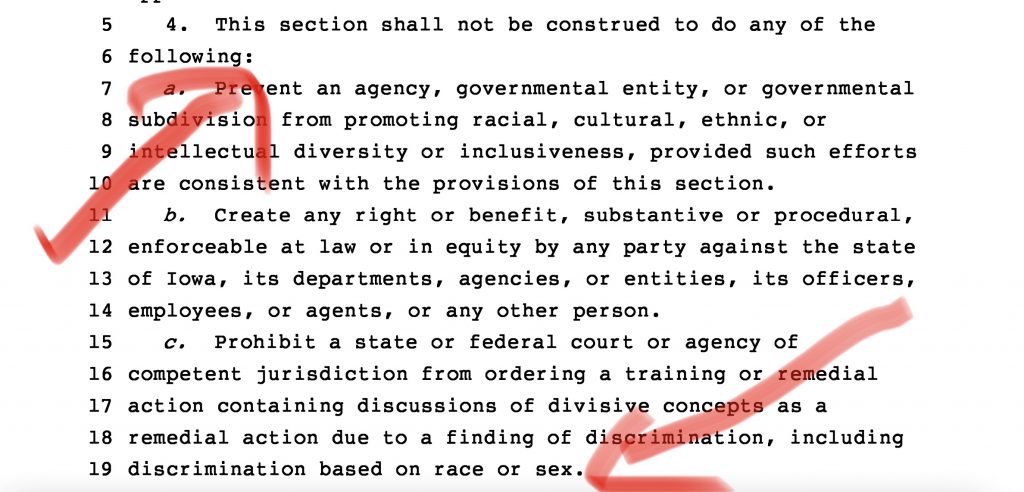DES MOINES, Iowa – The Iowa House passed HF 802, a bill that prohibits racial and sex stereotyping and scapegoating as part of diversity training offered by local governments, public school districts, and public institutions of higher learning.
The Iowa House initially passed the bill on March 16 by a 59 to 38 vote. The Iowa Senate amended and passed the bill last week by 30 to 18 vote. The vote in both chambers split along party lines, with Republicans voting in favor of the legislation and Democrats voting against it. The bill now heads to Gov. Kim Reynolds.
The bill prohibits “race and sex stereotyping” in diversity training, defined as:
- Ascribing character traits, values, moral and ethical codes, status, or beliefs to a race or sex, or to an individual because of the individual’s race or sex.
- Assigning fault, blame, or bias to a race or sex, or to members of a race or sex because of their race or sex, or claiming that, consciously or unconsciously, and by virtue of persons’ race or sex, members of any race are inherently racist or are inherently inclined to oppress others, or that members of a sex are inherently sexist or inclined to oppress others.
The bill prohibits explicitly prohibits certain “specifically defined concepts” from diversity training unless their discussion is required for context.
- That one race or sex is inherently better than another race or sex.
- That the United States or the state of Iowa is fundamentally racist or sexist
- By virtue of the individual’s race or sex, an individual is inherently racist, sexist, or oppressive, whether consciously or unconsciously.
- That an individual should be discriminated against or receive adverse treatment solely or partly because of the individual’s race or sex
- That members of one race or sex cannot and should not attempt to treat others without respect to race or sex.
- That an individual’s race or sex necessarily determines an individual’s moral character.
- By virtue of their race or sex, an individual bears responsibility for actions committed in the past by other members of the same race or sex.
- That any individual should feel discomfort, guilt, anguish, or any other form of psychological distress because of that individual’s race or sex
- That meritocracy or traits such as a hard work ethic are racist or sexist or were created by a particular race to oppress another race.
News reports of the Iowa Senate’s amendment led Democrats to charge falsely and the media to report that the Iowa Senate wanted to ban certain types of the curriculum.
Cynthia Fodor with KCCI News reported last week, “Opponents are now concerned it could eliminate teaching part of our history. A new amendment added to the bill states it would ‘prohibit curriculum that teaches the topics of sexism, slavery, racial oppression and segregation.'”
The language at issue in the amendment reads, “Prohibit the use of curriculum that teaches the topics of sexism, slavery, racial oppression, racial segregation, or racial discrimination, including topics relating to the enactment and enforcement of laws resulting in sexism, racial oppression, segregation, and discrimination.”
Those complaining about this language missed where the amendment instructed the language to be placed. It reads, “Page 2, inserting after line 19 by inserting.”
See screenshots:


When the amended version of the bill is available, that amendment language will appear as the fourth item (item “d”) in a list of things that the bill says, “This section shall not be construed to do any of the following.”
The amended legislation will say the exact opposite of what opponents claimed it would do. The Iowa Senate wanted to clarify those topics in a curriculum will NOT be prohibited by this bill should it become law.
State Rep. Steven Holt, R-Denison, the floor manager of the bill, criticized KCCI’s reporting explaining the context of the amendment.
“The amendment must be read in the context of where the language fits in the bill. I believe that the bill we originally passed was already clear on this, but (the Iowa Senate) wanted to be more specific, and I’m certainly okay with that,” he said. “Of course, these issues must be taught, they must be discussed, and they can be without scapegoating entire groups of people.”
State Rep. Mary Wolfe, D-Clinton, agreed with Holt that the Senate amendment did not change the bill substantively. She didn’t believe adding that language made the bill better.
“The fact that the Senate felt more comfortable, explicitly spelling out what the bill doesn’t do, even though it sounds like the bill does that. We’re gonna put language in there that says, ‘no, this is what it looks like it does, but it doesn’t really do.’ That’s some problematic drafting, and ultimately, as far as the Supreme Court is concerned, they’re gonna look at what the bill says, and the bill says that it does something and the fact that we say, later in the bill that it doesn’t do that, that I’m not sure that that’s going to cure the problem. So basically, again, I agree there’s been a lot of press on this bill, and it has not reflected well, on this body or on Iowa in general, in my opinion. I think it’s unfortunate that the Senate did not improve the bill but instead sought to make itself more comfortable by just changing the words around and not really making the bill any better,” she said.
During his closing comments, Holt countered and said that agreeing with the Senate amendment isn’t “about making the Senate happy, it’s about getting things done.”
“You seem to be suggesting Representative Wolfe in order to teach about racism and oppression and all the mistakes we’ve made in our history; we have to use these divisive concepts. And I categorically reject that. We don’t have to use racism to teach against racism. We don’t have to be racist and scapegoat entire groups of people in order to teach against racism. We don’t have to teach that the United States of America and the state of Iowa are systematically racist or sexist in 2021,” he said.
















